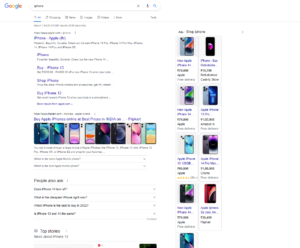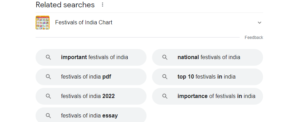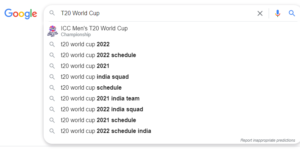
Search Engines are getting smarter every day. A few years back, when you searched for ‘iPhone,’ you would have got a mix of sellers’ websites, directories, review sites, and unboxing videos. But now, here is what you get when you search for ‘iPhone.’
As you can see, a highly optimized Apple microsite with snippets appears first, then comes ‘iPhone Wikipedia’, news, marketplace links, nearby store locators, blogs, reviews, and finally, ‘Related Searches.’ You could also see paid display ads on the right-hand top.

It’s interesting to see how Search Engines are evolving. Marketers are deploying advanced SEO strategies to achieve higher ranks on search result pages. Keywords being pivotal to search engine optimization (SEO), let’s first understand what Search Engines are and how they work.
Table of Contents
Search Engine
- Nine billion searches are done every day on google.
- The average person makes 3-4 searches every day.
- 45.3% of Google searches via mobile phones are voice searches.
- Using appropriate keywords in the URL can generate a 45% higher click-through rate.
- Search Engines give access to everything that you want.
- 95% of search traffic goes to the first page of the search result. If your website is adequately optimized, you may rank higher than your competitors and draw better traffic.
- Your site can rank higher in search results only if it is appropriately optimized.
- If a user has generated a query on a Search Engine, they already have high intent. So, if your site is optimized and ranks higher for the keywords, you are likely to get a successful sale. It will build credibility for your brand because you were visible when the consumer was looking for it.

How do Search Engines work?
- Crawlers: Searches engines use web crawlers or bots.
- Indexing: Like an index in the back of books, Search Engines processes information about keywords and their locations and indexes them on its server. When users search for a word, phrase, or anything they intend, the Google Search Engine algorithm looks for the search terms and finds appropriate pages.
- Processing: When a query is generated, Search Engines look for keywords and find the most relevant pages.
- Relevance: Several web pages may have similar information. The search Engines’ algorithm calculates the relevancy of such pages in its index.
- Results: Once relevancy is calculated, Search Engines then display the result in the correct order.
What happens when a search is performed?
When you enter a search query in a Search Engine, it identifies the relevant web pages/links indexed by crawlers and produces a list of links, ranked using an algorithm. It also uses data such as location, language, previous search history, and type of devices to produce the most relevant search result.
Why can some pages not be indexed?
- Robots.txt file Exclusion: It is a file that tells Search Engines which part of your website they should not visit and index.
- Directives for Crawlers: Directives on the webpage telling crawlers not to index the page or go ahead and index another similar page.
- Low-Quality Content: Crawlers find that the content on the page is either very thin, low quality, or duplicate, then they will not index them.
- Error: The URL returns an error page. (e.g., a 404 not found error).
Keywords:
You need keywords if you want to be found online. They are an essential part of SEO, but it has a different meaning for Users, Marketers, and Search Engines.
- For Users, Keywords are search queries.
- For Marketers, keywords are search trends.
- For Search Engines, keywords are signals for indexed results.
Types of Keywords
There are primarily three types of keywords.

- Short Tail: These are 1-2 words long keywords with high search volume and competition. Since it can generate a high search volume, its conversion rate is low. The marketing objective of Short Tail Keyword is to create awareness.
- Middle Tail: They are 2-3 words long keywords with medium search volume and competition. It generates lower volume than short-tail keywords but is more effective regarding conversion rate. The marketing objective of middle-tail keywords is to generate quality leads.
- Long Tail: These are 3-5 word long keywords with low search volume and competition but a high conversion rate. The marketing objective of Long Tail keywords is to get better conversion.
Apart from these three types of keywords, there is one more type called Brand Keyword. If a brand is popular, like Coke, or Honda, its name can also be optimized as a keyword. This makes the keyword exclusive to the brand.
Keywords directly associated with the brand’s product or services can also be called Brand’s keywords. For example, Prime Video and Amazon Music are both branded keywords for the brand Amazon as they are exclusive services of Amazon.
How to generate Keywords?
Keywords are important but finding the relevant keywords is the most crucial part of your SEO strategy. They help in achieving better rank in search engine result pages (SERPs) and hence can result in a better conversion rate.
As a marketer, it is critical for you to understand how and what a user is searching on the internet. You can do that by
- Brainstorming: If you have a well-defined customer persona for your products and services, you can brainstorm with your team to find out what your customers are looking for on the internet. For example, suppose you are selling organic fertilizers. In that case, you can assume that your customers may be searching for organic farming, kitchen gardens, terrace garden, plants for balconies, indoor and outdoor plants, and so on.
- Conducting Customer Survey: You can conduct a survey among your customers and ask them to search for your product on the internet and tell you how they navigated to your product. What search queries they ran on Search Engines and make a list of them. This will give you some potential keywords.
- Using Keywords Tools: Google helps find relevant words and terms for generating queries. Various other free and paid tools are available for marketers to generate keywords. Some of them are

i) Google’s Related Searches: When you generate a search query on Google, at the bottom of the SERP, it provides ‘Related searches.’
ii) Google Autosuggest: As soon as you start typing a search query on Google, it will show a list of suggested queries. For example, if you start typing a query for ‘T20 World Cup’, you will get a list of auto-suggests.
Google Autosuggest and Related Searches use Google LSI (Latent Search Indexing). In other words, LSI keywords are Google’s most searched words/phrases. The purpose of LSI is to understand the search queries better.
iii) Google Keyword Planner: You can use your competitors’ links to look for keywords that are working for them. Just put the link of any of the optimized web pages of your competitor in the Google keyword planner, and it will provide you with the list of keywords.

iv) SEMrush Keyword Magic Tool: It offers a database of more than 20 billion keywords. You can filter your list by topic, search intent, question type, Keyword difficulty, and competition metrics.
v) Keywordtool.io: This is also an excellent tool for generating a list of keywords that your competitors have used to optimize their web pages. You will have to buy its subscription to get a detailed report on keywords being used by your competitors.
There are many other tools like SpyFu and Moz, which can also help generate keywords.
Smart Tips:
Most of the tools mentioned above are chargeable. But some of them give some free trials for the day or month. Here is how you can generate a long list of keywords for free.
Step 1. Generate a search query on Google.
Step 2. Pick up the first 4-5 top links from the SERP.
Step 3. Put them one by one on the free trial version of SEMrush, which will essentially provide a long list of keywords used to optimize those links, resulting in a higher rank on SERP.
Step 4. You can use the subsequent 3-4 links or following page links from the SERP and similarly generate keywords to make a long list.
Keywords Shortlisting
Once you have done your research for keywords and prepared an extensive list, it is time to shortlist the most relevant keywords for your content. You should not stuff your content with keywords. Use only relevant and intended keywords.
Some keywords will give a high search volume; some will have high competition. Keywords with high competition mean it will need more effort to rank higher. So, pick up those keywords with high search volume but low competition.
Summary:
1. What is a Search Engine? How does it work?
2. How is indexing done? How is a search performed?
3. We also learned about Keywords. Types of keywords
4. How are keywords generated and further shortlisted?
Hey there. Thanks for stopping by!

I am Dipak Kumar. I am an entrepreneur and blogger. In my long professional journey, I have worked with various organizations at different levels as a marketer, retailer, and merchandiser. Throughout this journey, I have worked along the consumer funnel. I have witnessed customers’ ever-changing buying behaviours, from brick-and-mortar stores to organized retail to E-Commerce.
I am writing this blog to share my knowledge and understanding of trending news, events, and subjects from Marketing, Retail, E-Commerce, Edtech, Travel, and Start-Ups. It’s not a nine-to-five job for me. It is a whole day and night job requiring in-depth research and collaboration to put things together and bring a new perspective for your consideration. I love doing this and hope you also like it and share it with your contact and online communities.





Hello! Would you mind if I share your blog with my myspace
group? There’s a lot of folks that I think would really appreciate your content.
Please let me know. Thanks
Sure. Thanks
Simply wish to say your article is as astonishing.
The clearness in your post is simply cool and i could assume you are an expert on this subject.
Fine with your permission allow me to grab your RSS feed to keep updated with forthcoming post.
Thanks a million and please carry on the gratifying
work.
Take a look at my blog :: John E. Snyder
Thanks.
I was suggested this blog by my cousin. I’m not sure whether this post
is written by him as no one else know such detailed about my difficulty.
You’re amazing! Thanks!